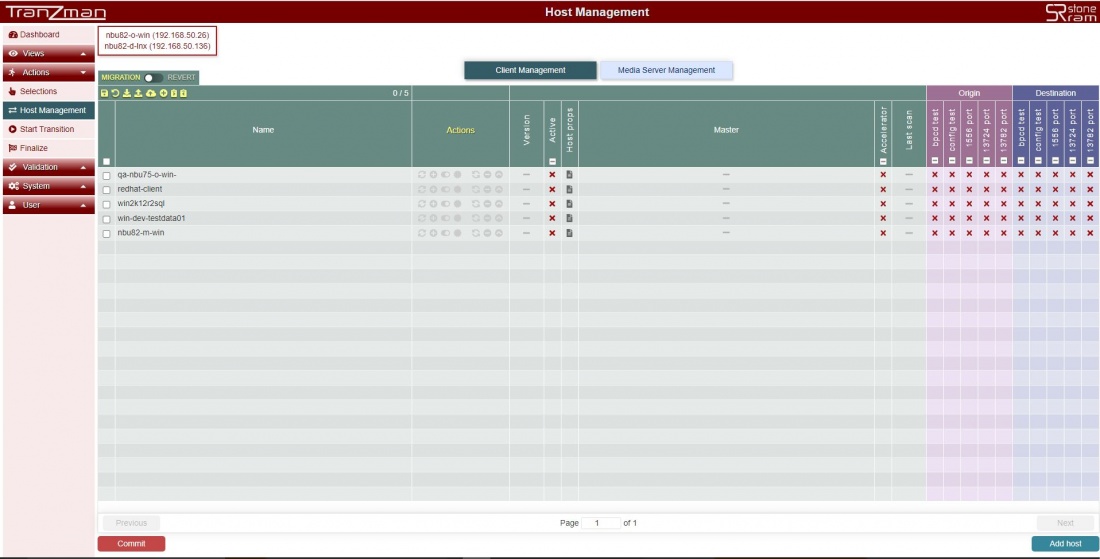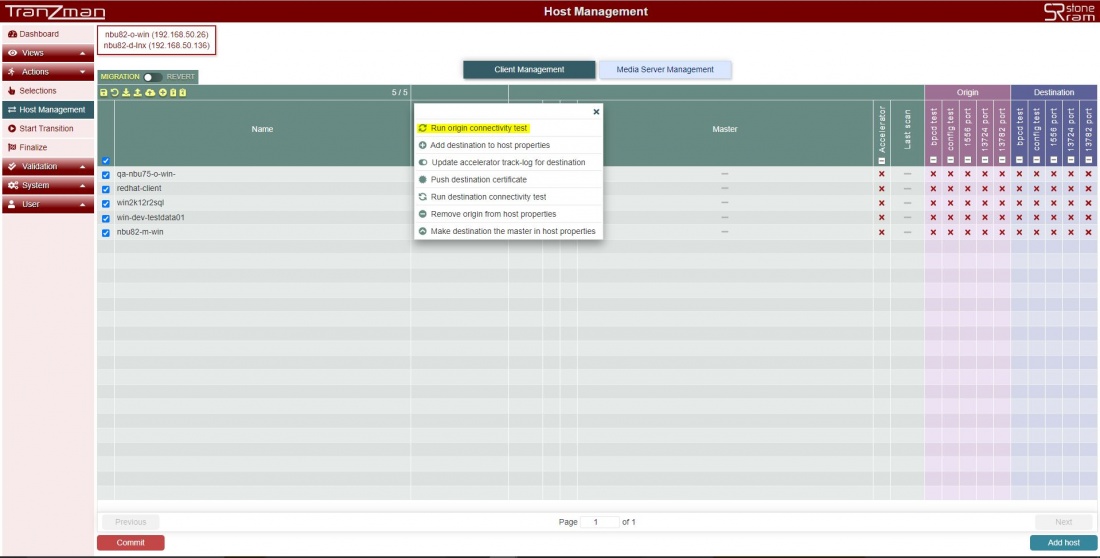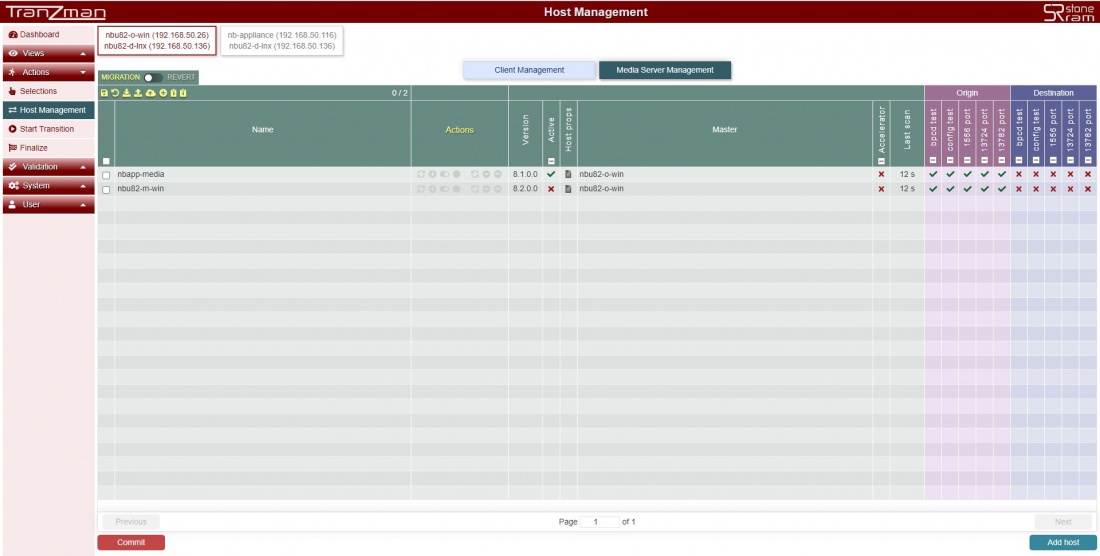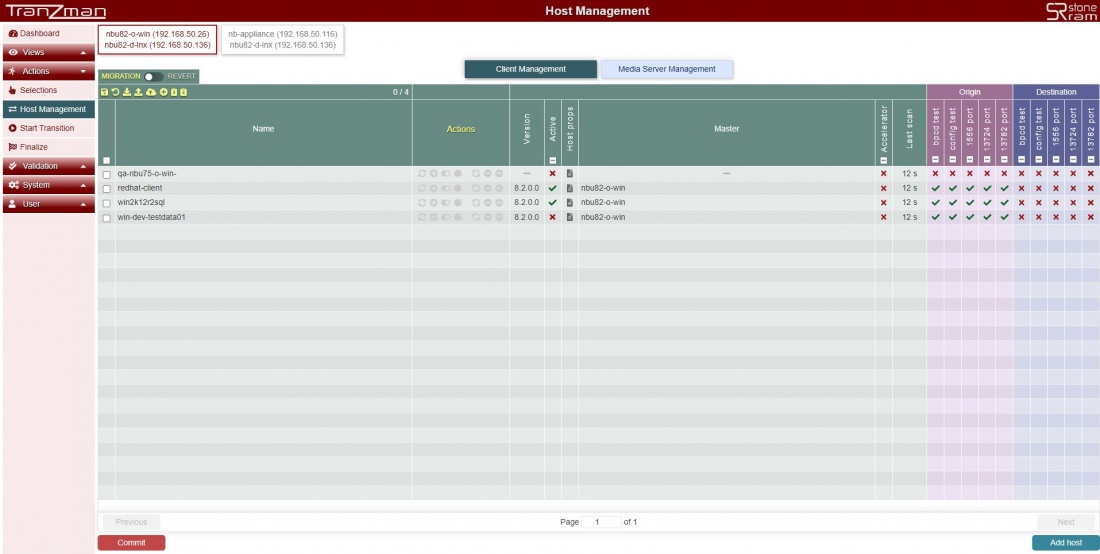Difference between revisions of "Manage Hosts"
| Line 98: | Line 98: | ||
===Step 4=== | ===Step 4=== | ||
| − | Below table | + | Now as shown in Figure 2 there are different actions which can be performed on NBU hosts. |
| + | Below table shows all the Actions that can be performed on the NBU hosts. | ||
| + | |||
| + | {|class="wikitable" style="border:5px double maroon" font-family:Arial, Helvetica, sans-serif !important align=center cellpadding=40px width=30%;;" | ||
| + | |- style="font-weight:bold; text-align:center; font-size:15px; font-family:'Arial Black', Gadget, sans-serif !important;;" | ||
| + | | Action | ||
| + | | style="font-weight:normal; text-align:left;" | Description | ||
| + | |- | ||
| + | | style="font-size:15px; font-family:Arial, Helvetica, sans-serif !important;;" | Run origin connectivity test | ||
| + | | Runs a connectivity test for all the NBU hosts from the origin master server | ||
| + | |- | ||
| + | | style="font-size:15px; font-family:Arial, Helvetica, sans-serif !important;;" | Add destination to host properties | ||
| + | | Add the destination master server name to bp.conf (*nix )or registry(Windows) on selected NBU hosts. | ||
| + | |- | ||
| + | | style="font-size:15px; font-family:Arial, Helvetica, sans-serif !important;;" | Update accelerator track-log destination | ||
| + | | Updates the accelerator by forcing the new master server name in the track logs. | ||
| + | |- | ||
| + | | style="font-size:15px; font-family:Arial, Helvetica, sans-serif !important;;" | Push destination certificate | ||
| + | | It adds the CA Certificate and host ID certificate from the destination master server to the selected NBU hosts. | ||
| + | |- | ||
| + | | style="font-size:15px; font-family:Arial, Helvetica, sans-serif !important;;" | Run destination certificate | ||
| + | | Runs a connectivity test for all the NBU hosts the destination master server | ||
| + | |- | ||
| + | | Remove origin from host properites | ||
| + | | Deletes the master server name from bp.conf (*nix) or registry(Windows) on selected NBU hosts | ||
| + | |- | ||
| + | | Make destination the master in host properties | ||
| + | | In case when there are both origin and destination master server name in bp.conf(*nix) or registry(Windows) selecting and running this option will promote the destination master server name over origin. | ||
| + | |} | ||
Revision as of 11:20, 21 August 2020
| Note: This section is Applicable to migrations which involves NetBackup versions 8.1 and later. |
Contents
Headline
NetBackup uses security certificates to authenticate NetBackup hosts. The security certificates conform to the X.509 Public Key Infrastructure (PKI) standard. A master server acts as the Certificate Authority (CA) and issues digital certificates to hosts. NetBackup 8.1 and later hosts can communicate with each other only in a securemode. NetBackup 8.1 hosts must have a Certificate Authority (CA) certificate and a host ID-based certificate for successful communication.For more details please refer to the NetBackup Security and Encryption guide.
So for migrations between NetBackup 8.1 and later , CA Certificate and host ID certificates need to be deployed to all the NBU hosts from the destination master server.
Tranzman has a brilliant feature which does these deployments named Host Management.
You can access the Host Management from Tranzman UI under Actions->Host Management. Host Management is a vast thing in itself so to understand it better you do need to have some basic information information on how certificates actually work in NetBackup.
Follow the below steps to deploy the certificates from the destination master server to the NBU hosts :-
Step 1
Click on Actions->Host Management.Now as we are already in the data transfer stage all the NBU hosts should be discovered and should be displayed on the Host Management Page under Client Mangement. e.g. Figure 1 shows all the NBU hosts including media servers.
Step 2
Select all the eligible NBU hosts then Actions -> Run origin connectivity test as shown in the below screenshot(Figure2) and hit
You would see couple of jobs being triggered named CheckConn under Views->Activity Monitor. Wait for them to complete and the respective columns on the Host Management page should get populated with
rather than
.
Step 3
A successfull connectivity test from origin should move the media servers to the Media Server Management tab(as shown in Figure 3) and only backup clients should be seen under Client Management(Figure 4).
Below table explains the Host Management columns.
| Name | Name of the NBU host |
| Actions | Selected actions for the NBU host |
| Version | Version of NetBackup |
| Active | State of Host (Active only if backup has ran in last 7 days) |
| Host props | NBU Host properties |
| Master | Current Master Server for NBU host |
| Accelerator | Accelerator Enabled/Disabled |
| Last scan | Time since last host management scan has been done |
| bpcd test | |
| config test | NBU bpgetconfig test |
| 1556 port | pbx port |
| 13724 port | vnetd port |
| 13782 port | bpcd port |
Step 4
Now as shown in Figure 2 there are different actions which can be performed on NBU hosts. Below table shows all the Actions that can be performed on the NBU hosts.
| Action | Description |
| Run origin connectivity test | Runs a connectivity test for all the NBU hosts from the origin master server |
| Add destination to host properties | Add the destination master server name to bp.conf (*nix )or registry(Windows) on selected NBU hosts. |
| Update accelerator track-log destination | Updates the accelerator by forcing the new master server name in the track logs. |
| Push destination certificate | It adds the CA Certificate and host ID certificate from the destination master server to the selected NBU hosts. |
| Run destination certificate | Runs a connectivity test for all the NBU hosts the destination master server |
| Remove origin from host properites | Deletes the master server name from bp.conf (*nix) or registry(Windows) on selected NBU hosts |
| Make destination the master in host properties | In case when there are both origin and destination master server name in bp.conf(*nix) or registry(Windows) selecting and running this option will promote the destination master server name over origin. |



